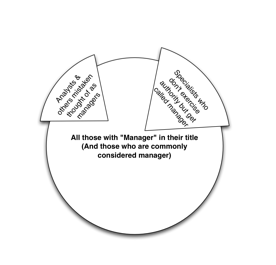Analysts aren’t managers
Continuing from my last blog, Managers who aren’t managers, I need to say a bit more about people who aren’t managers but get talked about managers.
This is a group of people who aren’t managers and wouldn’t consider themselves managers but programmers and testers consider to be managers. I’m thinking specifically about Business Analysts but there are others.
To a programmer, who rolls in at 10.30am wearing old jeans and a t-shirt to spend the whole day communing with a machine, well, a Business Analyst looks like a manager. The BA is smartly dressed, they meet “customers” and “stakeholders”, they write documents, they tend to keep business hours – because thats when the people they need to speak to are available!
OK, I’m pandering to the stereotypes but you get the message. In my experience a lot of programmers and testers wrongly consider Business Analysts to be Managers. They are not.
Interestingly if you hang around with Business Analysts and listen to them you will find that most of their concerns are the same as the programmers: not having enough time to do their job properly, being overloaded with work, not being listened to by their managers, and so on. But the two groups often end up antagonising each other.
What I’m getting at is this: there are a lot of people who are mistakenly thought of as “Managers” in a software organization.
This is important because when we start talking about self-managing teams and teams without managers these specialists often seen as part of the general problem with “managers.”
There may even be some people who are happy to make this mistake: some programmers I have know think they can do a better job than the business analysts or product manager they are working. Some of them may be right – they should switch professions. And a few of them would see these specialists wiped out at the same time as whip-cracking managers.
If we are to remove product managers just because these requirements specialists have the word “manager” in their title, and remove business analysts just because they dress smartly and go to lots of meetings, then why aren’t we removing JavaScript specialists too? For that matter database specialists and anyone who doesn’t write in the chosen language should go!
True, software development tends to work better when people are prepared to do what is needed – coding, testing, requirements gathering – rather than stand on demarcation lines and declare they won’t test because they are a programmer.
Staffing a team with people who have multiple skills, who are multi-functional and do what is needed to help the team is great. But…
It has its limits.
Few C++ programmers have the skills (or want) to code JavaScript and even fewer JavaScript programmers have the skills to code C++. The same is true when it comes to Testing, Business Analysis, Product Management and a host of other skill sets.
Just because someone’s skills set means they hold a job where they don’t code does not make them a manager.
| Reference: | Analysts aren’t managers from our JCG partner Allan Kelly at the Agile, Lean, Patterns blog. |




A BA is anti-pattern. Business analysis is a process, not a job. It is the job of the developer (look it up in 20+ year old books – you wont see the title “BA”). Adding someone with the title of BA is ignoring Mythical Man Month and ignoring that it is worse than just adding more developers. Comparing knowing programming languages vs doing business analysis is apples vs wood. During my 20+ year career I have seldom had a “BA”. When i did, they only caused issues because they didn’t know the business as well as the business nor technology… Read more »